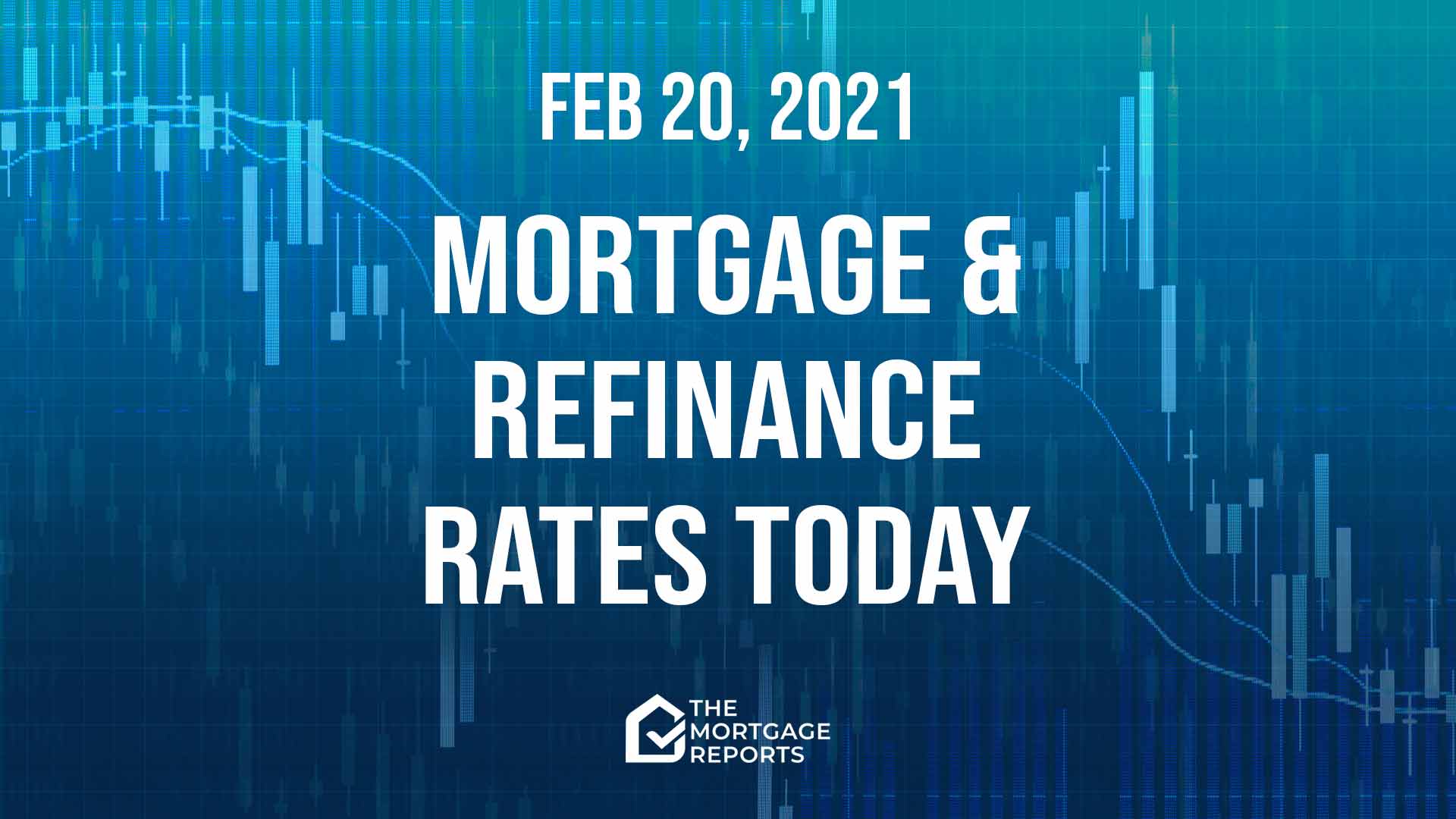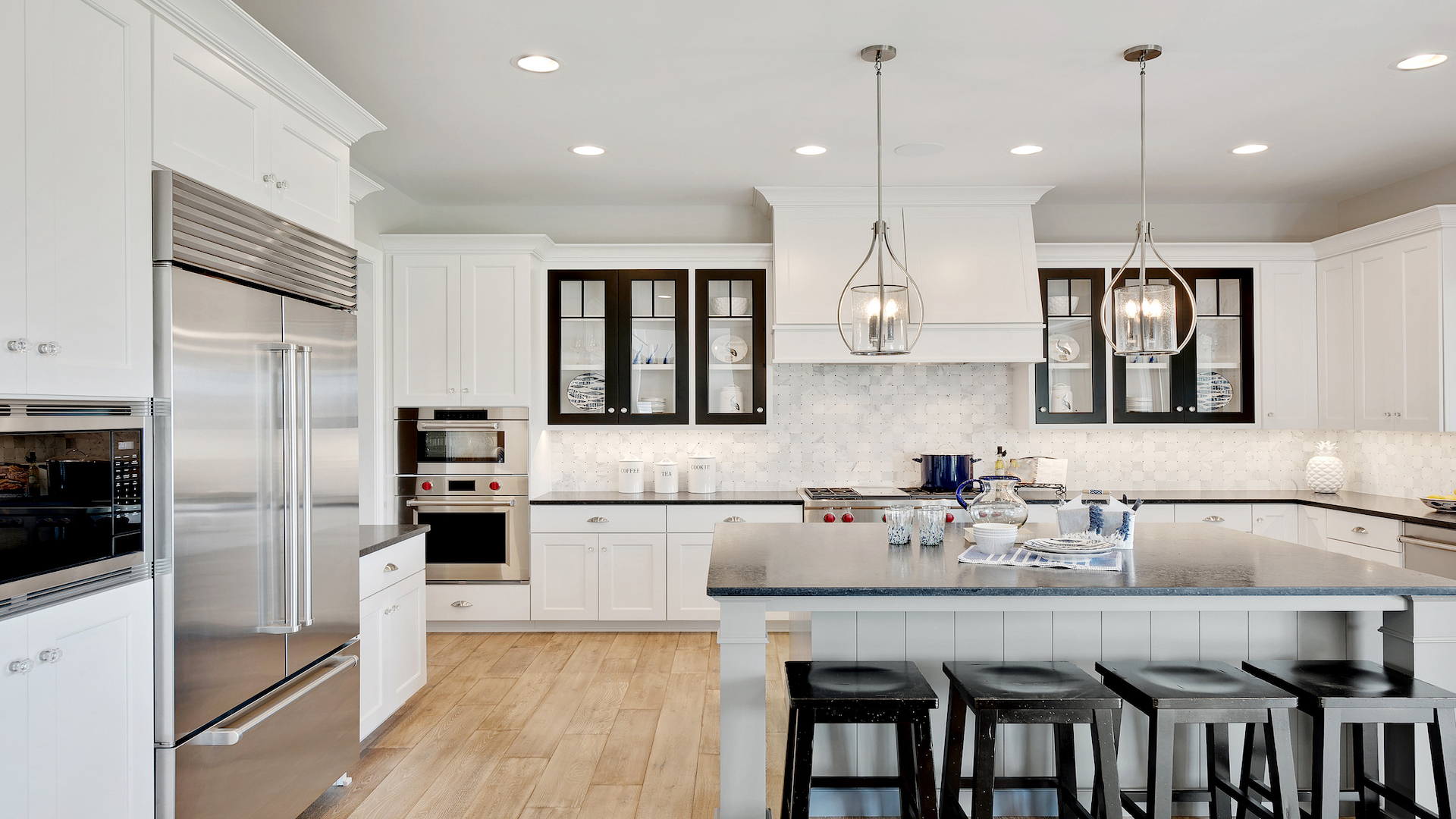
Today’s mortgage and refinance rates
Average mortgage rates nudged higher on Friday. It was a bad week for these rates. And they’re now hovering around the 3% mark even for the best borrowers wanting 30-year, fixed-rate mortgages (FRMs).
There’s always a possibility of sudden and sharp falls. But, right now, that seems a small one. And it’s looking more likely that we’ll see mortgage rates remain roughly where they are or edging higher this week. More below.
Apologies if you tried to access this page at its usual publication time of Saturday afternoon. A technical glitch delayed its posting.
Find and lock a low rate (Feb 21st, 2021)| Program | Mortgage Rate | APR* | Change |
|---|---|---|---|
| Conventional 30 year fixed | |||
| Conventional 30 year fixed | 2.949% | 2.952% | +0.02% |
| Conventional 15 year fixed | |||
| Conventional 15 year fixed | 2.519% | 2.528% | +0.04% |
| Conventional 20 year fixed | |||
| Conventional 20 year fixed | 2.887% | 2.894% | +0.02% |
| Conventional 10 year fixed | |||
| Conventional 10 year fixed | 2.569% | 2.593% | +0.12% |
| 30 year fixed FHA | |||
| 30 year fixed FHA | 2.69% | 3.366% | +0.01% |
| 15 year fixed FHA | |||
| 15 year fixed FHA | 2.485% | 3.067% | +0.03% |
| 5 year ARM FHA | |||
| 5 year ARM FHA | 2.5% | 3.213% | Unchanged |
| 30 year fixed VA | |||
| 30 year fixed VA | 2.25% | 2.421% | Unchanged |
| 15 year fixed VA | |||
| 15 year fixed VA | 2.128% | 2.448% | Unchanged |
| 5 year ARM VA | |||
| 5 year ARM VA | 2.5% | 2.392% | Unchanged |
| Rates are provided by our partner network, and may not reflect the market. Your rate might be different. Click here for a personalized rate quote. See our rate assumptions here. | |||
COVID-19 mortgage updates: Mortgage lenders are changing rates and rules due to COVID-19. To see the latest on how coronavirus could impact your home loan, click here.
Should you lock a mortgage rate today?
If you’re still floating your rate, you’re probably worried that you’ll miss out on any falls that might turn up. And you’re right. Those could yet happen.
But the odds on those occurring to a worthwhile extent are currently looking slim. Meanwhile, the possibility of further rises seems to me larger. So I’d lock now, if I were you.
But I don’t have a crystal ball. And the decision must be wholly yours.
Still, I changed my recommendations during the week. And they’re now:
- LOCK if closing in 7 days
- LOCK if closing in 15 days
- LOCK if closing in 30 days
- LOCK if closing in 45 days
- LOCK if closing in 60 days
However, with so much uncertainty at the moment, your instincts could easily turn out to be as good as mine — or better. So be guided by your gut and your personal tolerance for risk.
Compare top lenders
Refine results by loan type:
What’s moving current mortgage rates
Things have certainly moved on since last weekend’s edition. And not in a good way. But why? Well …
Rosy outlook = higher mortgage rates
In a CNN Town Hall in Milwaukee on Feb. 17, President Joe Biden said he expected that COVID-19 vaccines would be available to every American “by the end of July.” And that, along with the following, pushed mortgage rates appreciably higher:
- The president’s $1.9 trillion pandemic relief plan remains on track to become law
- COVID-19 infection, hospitalization and death rates continue to fall
- Concerns grew about the possibility of future inflation
It was a perfect storm for mortgage rates. And positive economic data on retail sales didn’t help.
Falls not off the menu
As is usually the case when they’re in a bullish mood, investors’ focus is on positive news. But, if they shifted their perspective, they’d see plenty of reasons for concern. And if any of those materialized, mortgage rates could fall back.
Perhaps the most obvious threat to the current optimism is the possible emergence of a mutated strain of SARS-CoV-2 that is resistant to current vaccines. So far, three known variants (from the UK, South Africa and Brazil) are circulating within the US, according to the Centers for Disease Control and Prevention (CDC). And there seems little reason to think vaccines are ineffective against these. But we’re very likely to see more.
Another possible trigger for future falls in mortgage rates is a stock market collapse. We reported on Friday that there’s more chatter about such a possibility in the financial press. And the Federal Reserve announced on Feb. 12 that it wanted US banks to include a scenario in which stock prices fell 55% in their 2021 stress tests.
These are real possibilities. But nothing more than that. And you have to ask yourself how likely it is that either or both (or some completely different savior) will ride to your rescue before your closing date.
Economic reports next week
Watch out for Friday’s personal income and spending data this week. The other reports are likely to cause waves only if they’re significantly adrift from forecasts.
Here are next week’s main economic reports:
- Monday — January leading indicators
- Wednesday — January new home sales
- Thursday — Weekly new claims for unemployment insurance. Plus the second reading of America’s gross domestic product (GDP) during the last quarter of 2020. Also, January advance durable goods orders
- Friday — January personal income and personal spending
Note, too, that Federal Reserve Chair Jerome Powell is due to appear before the Senate Finance Committee and House Financial Services Committee on Tuesday and Wednesday. Fed chairs’ remarks always have the potential to move markets.
Find and lock a low rate (Feb 21st, 2021)
Mortgage interest rates forecast for next week
Well, I couldn’t have been more wrong last week when I said, “I’m not expecting mortgage rates to move far next week.” But, if you’re still interested in my predictions, I think it most likely that those rates will remain within spitting distance of the 3% mark for now for top-tier borrowers wanting 30-year FRMs.
Mortgage and refinance rates usually move in tandem. But note that refinance rates are currently a little higher than those for purchase mortgages. That gap’s likely to remain constant as they change.
How your mortgage interest rate is determined
Mortgage and refinance rates are generally determined by prices in a secondary market (similar to the stock or bond markets) where mortgage-backed securities are traded.
And that’s highly dependent on the economy. So mortgage rates tend to be high when things are going well and low when the economy’s in trouble.
Your part
But you play a big part in determining your own mortgage rate in five ways. You can affect it significantly by:
- Shopping around for your best mortgage rate — They vary widely from lender to lender
- Boosting your credit score — Even a small bump can make a big difference to your rate and payments
- Saving the biggest down payment you can — Lenders like you to have real skin in this game
- Keeping your other borrowing modest — The lower your other monthly commitments, the bigger the mortgage you can afford
- Choosing your mortgage carefully — Are you better off with a conventional, FHA, VA, USDA, jumbo or another loan?
Time spent getting these ducks in a row can see you winning lower rates.
Remember, it’s not just a mortgage rate
Be sure to count all your forthcoming homeownership costs when you’re working out how big a mortgage you can afford. So focus on your “PITI” That’s your Principal (pays down the amount you borrowed), Interest (the price of borrowing), (property) Taxes, and (homeowners) Insurance. Our mortgage calculator can help with these.
Depending on your type of mortgage and the size of your down payment, you may have to pay mortgage insurance, too. And that can easily run into three figures every month.
But there are other potential costs. So you’ll have to pay homeowners association dues if you choose to live somewhere with an HOA. And, wherever you live, you should expect repairs and maintenance costs. There’s no landlord to call when things go wrong!
Finally, you’ll find it hard to forget closing costs. You can see those reflected in the annual percentage rate (APR) you’ll be quoted. Because that effectively spreads them out over your loan’s term, making that higher than your straight mortgage rate.
But you may be able to get help with those closing costs your down payment, especially if you’re a first-time buyer. Read:
Down payment assistance programs in every state for 2020
Compare top lenders
Refine results by loan type:



